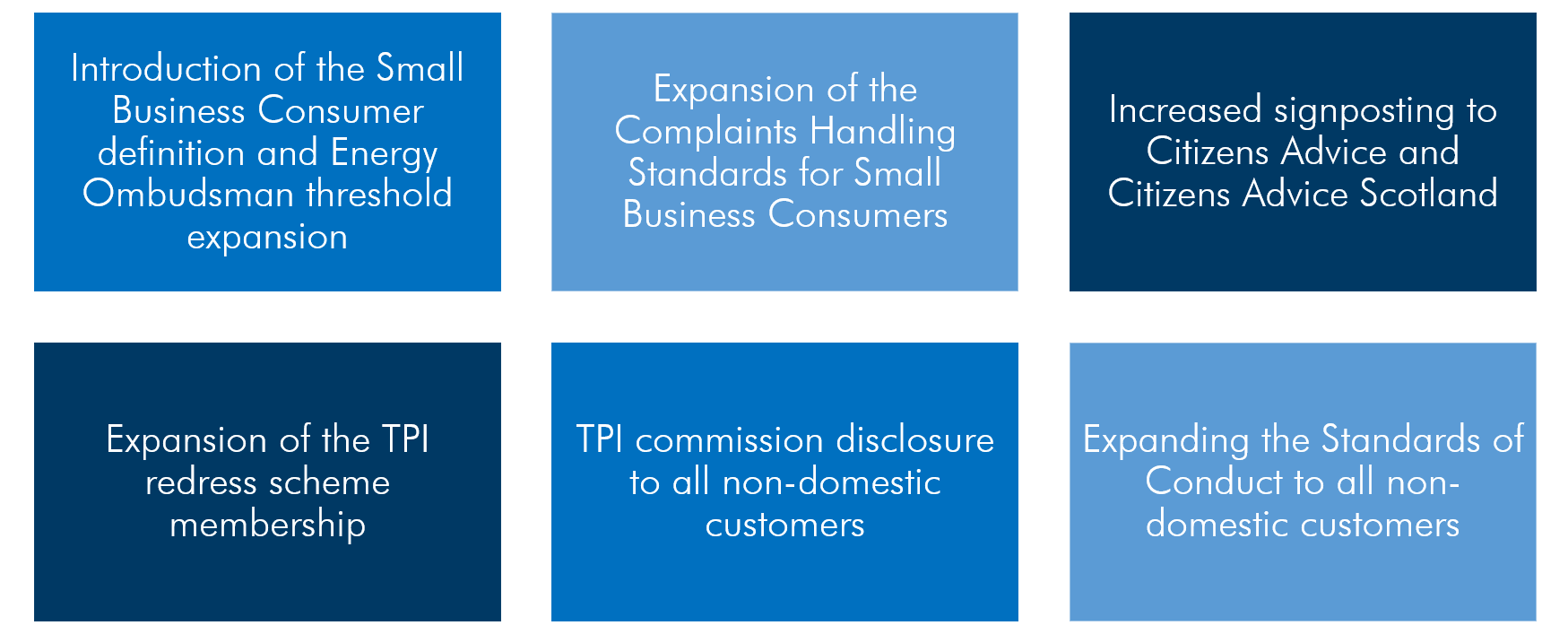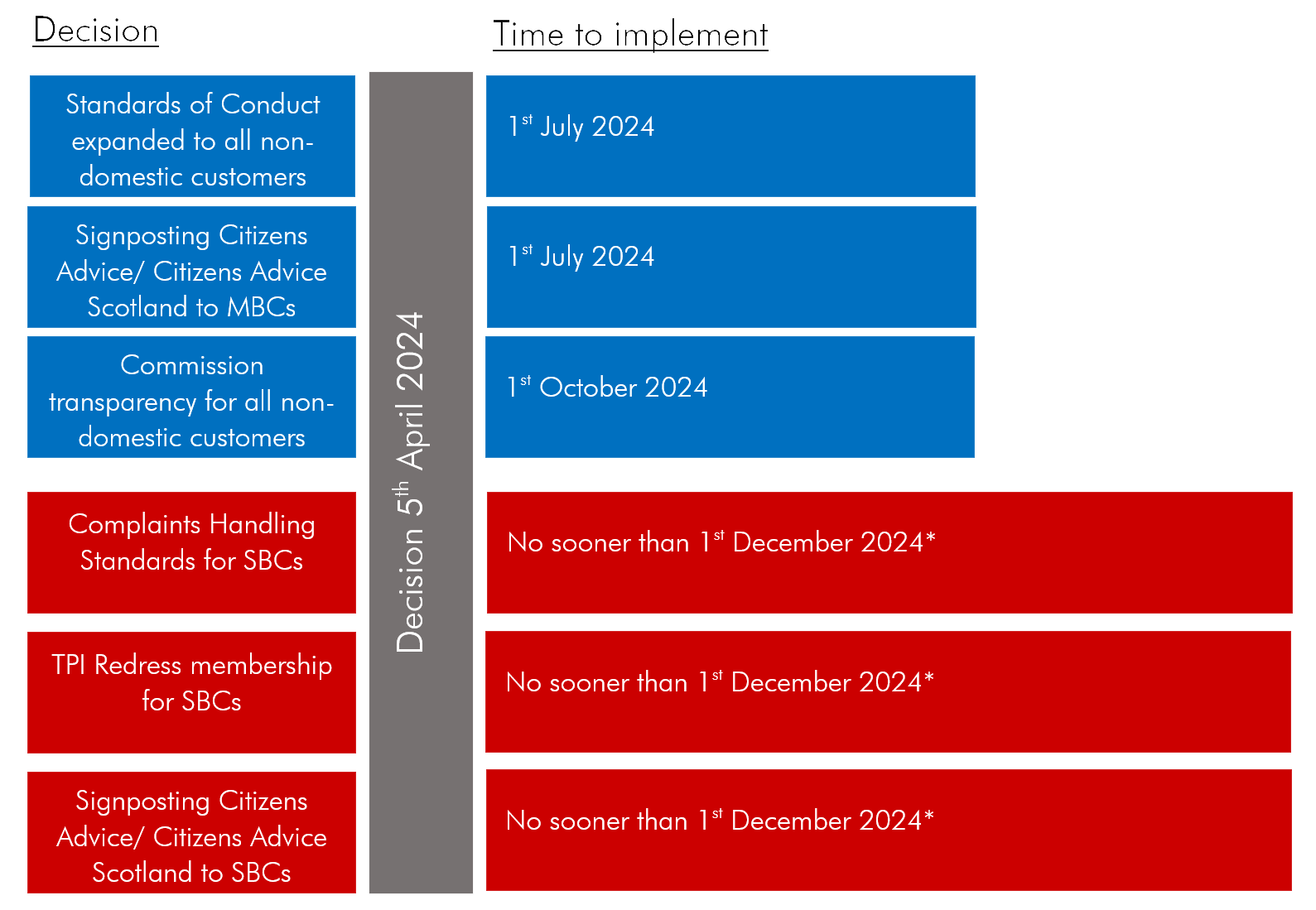
The non-domestic market has found itself at the precipice of change yet again, nearly a year after the publication of the government’s call for evidence. The initial document, which outlined the government’s vision for a better energy retail market, proved to be a catalyst for consequential change during 2023. On the 5th of April 2024, Ofgem published its non-domestic market review (NDMR) decision, which will bring change for both suppliers and Third-party intermediaries alike. The decision also reaffirmed Ofgem’s intention to increase business customer protection and promote transparency across the industry.
The introduction of the Small Business Consumer (SBC) definition was the central focus of the decision document. Many of the changes made were done so in collaboration with other key stakeholders to establish and incorporate SBCs into the non-domestic market (as shown in Figure 1).
 Figure 1
Figure 1In December 2023, the Department of Energy Security and Net Zero (DESNZ) published their initial proposal for the Small Business Consumer (SBC). This came after identifying a protection gap for businesses larger than micro businesses. Many of these customers do not have the financial resources or industry knowledge required to access redress effectively or independently.
Subject to Parliamentary timescales the new SBC definition, which is mutually exclusive of the MBC definition, will be introduced alongside the proposal to expand the Energy Ombudsman threshold. The expansion will allow small business consumers access to Alternative Dispute Resolution (ADR).
The Small Business Consumer definition:
OR
OR
The thresholds will be subject to review 12-18 months after implementation to ensure that they are fit for purpose.
The SBC definition will mean a change to existing legislation. It has been indicated that such reform will come about around the 1st of December 2024.
The Consumer Complaints Handling Standards (CHS) prescribe how suppliers handle and record complaints currently for micro business customers.
It has since been confirmed that the CHS regulations will be amended to capture SBCs. The expansion also ensures that alignment occurs with the government’s proposal, as it gives SBCs the right to be signposted to the Energy Ombudsman.
Suppliers will be required to signpost both MBCs and SBCs to Citizens Advice and Citizens Advice Scotland. The introduction of this requirement is part of an effort to increase non-domestic customers’ awareness of Citizens Advice and ensure that they are kept informed of the support available and receive support on any issues they may have.
The change will be introduced as two separate licence conditions in two stages, to reflect the time needed to legally define SBCs. Signposting for MBCs will come into effect first and SBCs will follow after as it is reliant on the CHS legislation expansion being in place.
In 2023 Ofgem published the non-domestic market review: findings and policy consultation in which the idea of expanding the requirement for TPIs to sign up to a Qualifying Dispute Settlement Scheme (QDSS) was first presented. At the time, the current scope was limited to micro business consumers, in that, the supplier must ensure that the TPI was a member of a QDSS. The subsequent publication of the decision document confirmed that suppliers must ensure that TPIs must be registered with a QDSS if they are also working with SBCs.
This again, is keeping in line with DESNZ’s intention to expand access to the Energy Ombudsman scheme so that an SBC can seek ADR against both a supplier and a TPI if needed.
The imposition on suppliers to work with registered TPIs serves as a reminder that Ofgem is currently unable to regulate TPIs directly and so has resorted to doing so through suppliers. However, in the decision document, it was stated that the government will be considering whether they should introduce sectoral regulation for TPIs in the future.
Third-Party Intermediary Commission disclosure
Previously suppliers were only required to disclose third-party intermediary (TPI) commission information to micro businesses to enable customers to make more informed decisions when selecting a supplier. This is because they would have a more comprehensive understanding of the costs that are from the third-party fees, which is thought to allow for easier price comparison.
Within the decision document, it was announced that suppliers will be required to disclose TPI commissions to all non-domestic customers on a cost-per-unit basis. It was also emphasised that micro businesses will retain their current prescribed format of a cost-per-unit basis and a lump sum.
Ofgem stated their preference for the TPI commission to be disclosed in the principal terms however this is not prescribed in the licence conditions.
Standards of Conduct expansion
The standards of conduct (SoC) serve as a set of overarching principles that focus on the customer outcome delivered by suppliers. As stated in the December 2023 statutory consultation, when conducting their market research Ofgem found that the most common reasons for customer dissatisfaction were all captured under the Designated Activities [1]in the SoC and also found that customers of all sizes were affected.
Prior to the publication of the non-domestic market review, the SoC only applied to Domestic customers and Micro Business Customers (MBC). However, the results of the market research encouraged Ofgem to expand the SoC to accommodate all non-domestic customers on the basis that it would help to improve the service customers receive and encourage suppliers to treat all customers fairly.
Next steps
There are several key stakeholders involved in the implementation of the approved policies. Figure 2 below outlines the individual timings for each of the policies, it is important to note that the following SBC changes are dependent on the Gas and Electricity (Consumer Complaints Handling Standards) Legislation 2008 being amended:
While an exact date for these changes has not been confirmed, Ofgem stated that they would come into effect no sooner than 1st December 2024 and at least 3 months’ notice will be issued once the date has been confirmed.
Implementation Timeline

Figure 2
Other work in progress
During the non-domestic market review, Ofgem provided an update on additional areas of change that did not require any legislative or licence changes.
Change of Tenancy Process
The Retail Energy Code Company (RECCo) were assigned the task of streamlining the change of tenancy (CoT) process including the development of proposals for a consistent set of documents to demonstrate a valid change of tenancy. The workgroup will continue to develop proposals which will be considered by Ofgem in late spring/early summer.
Billing Transparency
On the 5th of April 2024, Ofgem published the best practice guide for non-domestic billing transparency alongside their non-domestic market review decisions. The guide aims to provide more consistency across the industry and allow customers to understand the individual cost elements that make up their overall bill. Alongside the guide, Ofgem also provided a set of industry terms and definitions to further aid customers in gaining a deeper understanding of industry language.
Cooling-off period
Ofgem has been in communication with consumer groups regarding the issues they are facing in which they feel a cooling-off period would be an appropriate solution. Currently in the early stages of analysis work to understand the issues and will consider the most appropriate solution in due time.